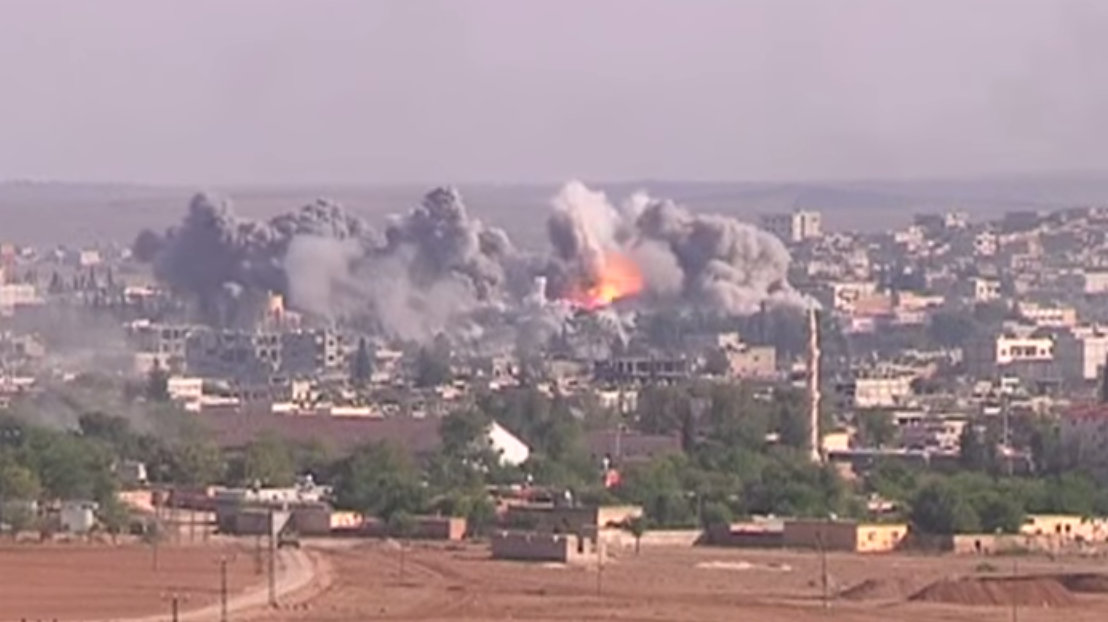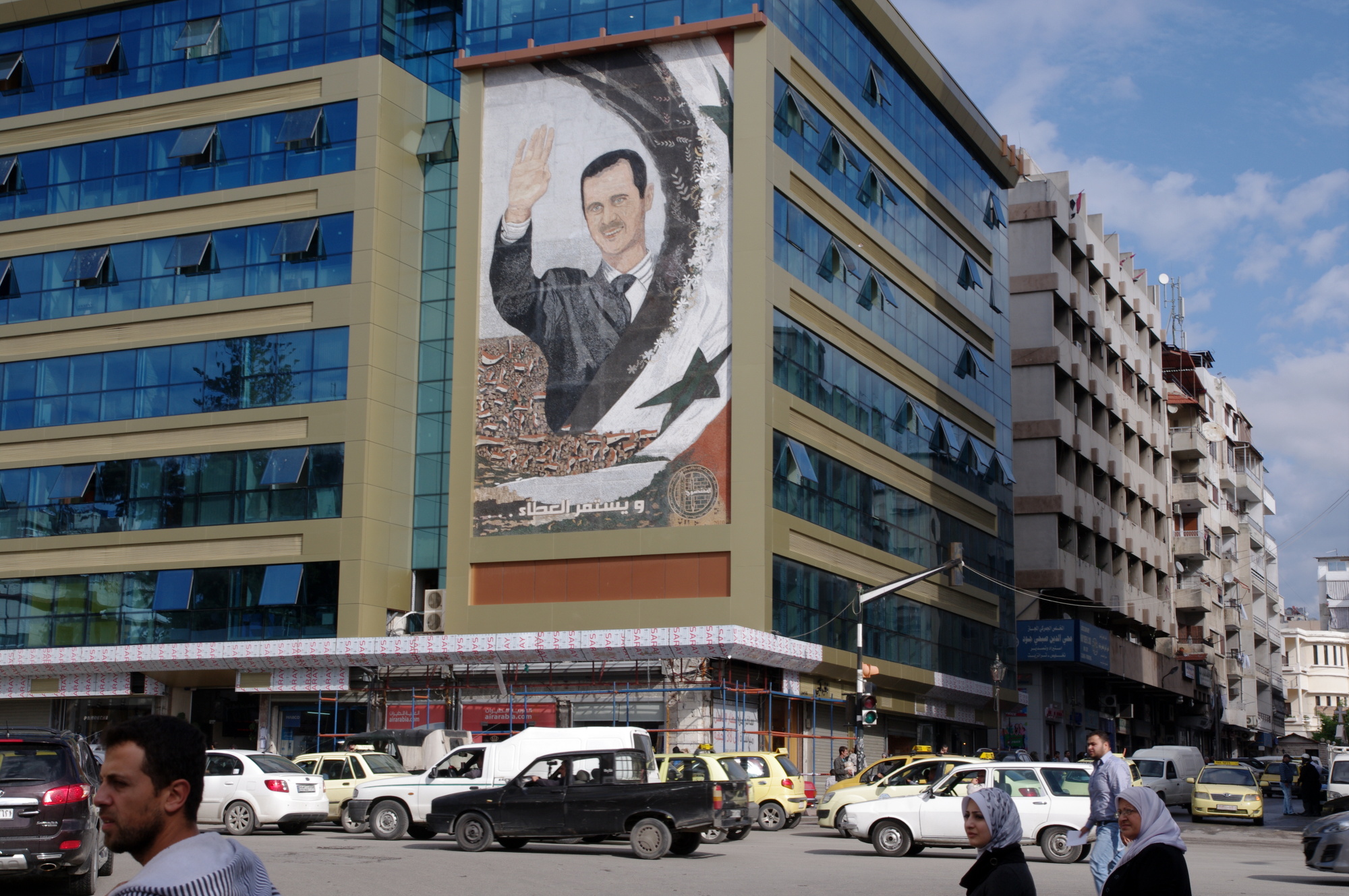
Coalition airstrikes in Kobane, Syria
There are little who have failed to notice the rise of ISIS. With brutality beyond comprehension, yet also with Machiavellian genius, the self-proclaimed “Islamic state” has courted the alarm and disgust of the world. The horror induced by their expanding frontiers resulted in, a year ago, a coalition of countries (predominantly from the west) teaming up to perform routine airstrikes to halt their advance. Just weeks ago, Turkey joined the cause, in a move which was hailed by the international community as an apparent “game changer”. However this, combined with the wider American ambitions, is a façade at best. All the PR in the world cannot blanket the fact that US and western policy towards the Syrian conflict and ISIS is amounting towards an absolute catastrophe. It’s one without strategy, it’s one without direction. It is not only blind, but blindfolded too. The ability to defeat ISIS is lost spectacularly in a sticky web of American conflicts of interest. America wants to get rid of ISIS, but also Assad too, it’s a calamity “best of both worlds” policy.
For several years now it has been the primary goal of the United States and Western allies to remove the regime in Syria led by Bashir Al-Assad. What began as a violent crackdown on Arab spring protests exploded corrosively into a conflict which has cost more than a quarter of a million lives and has displaced nearly 10 million more. The consequences of this conflict ripped up sectarian divisions in the country, giving capital to ISIS, who have been able to claim huge swathes of territory throughout the country. This was for a long time, ignored, perhaps even viewed as beneficial by the U.S who had been aware of the group’s existence and its behaviour since it proclaimed itself as an “Islamic state” in 2006. It was only when the “caliphate” had almost brought down the Iraqi government through seizing Mosul and radiating its infamous execution videos did America and the west eventually change their minds; perhaps it wouldn’t be convenient at all for ISIS to be the ones who overthrow the regime that they were so desperate to remove. Thus came the airstrikes.
Of course, the question of who one would prefer over Assad and ISIS is a no brainer. Assad has been brutal, yet is a kitten and highly civilized when compared to the atrocities ISIS are committing. As Assad’s regime is fighting ISIS, it would be logical to assume a “the enemy of my enemy is my friend” strategy and get rid of the worst one in the interests of peace. But no, Obama is juggling frantically in the belief that he can topple the Assad regime and get rid of ISIS at the same time; he argued he could achieve this by training the “moderate rebels” of the Free Syrian Army alongside the ISIS airstrikes. It is not about what is most practical, it is about his burning ambition to complete a regime change in this country whilst also saving the face of America from the shame of ISIS success they have induced.

Syrian dictator Bashar al-Assad, “a kitten” when viewed besides ISIL
This strategy however, is not going well. First of all, the US has been criticised by the Free Syrian Army “moderate” rebels for a grindingly slow “training” process which has saw only 60 soldiers trained in the space of a year, sparking claims that it would take “decades” to make an impact. Second of all, these “moderate” rebel groups have become a virtually irrelevant dynamic in the Syrian conflict. Most of their territory consists of a tiny enclave in the North West corner of the country in Aleppo. They are dwarfed by ISIS, who controls more of Syria than any other actor in this war, more even than the Baathist Assad regime itself now. Although set back by the Kurdish militias in the North, ISIS have made successive assaults and gains against the Syrian government in the south and in the west. In May this year they seized the historic city of Palmyra, then in early August they ceased the strategic city of Al-Qaryatayn; closing in on the Homs-Damascus highway, which if seized will cut the Assad regime’s remaining territory in two. In addition to that, ISIS launched a massive assault on rebel held territories in Aleppo on the 11th August. America’s “best of both worlds” strategy of juggling two explosive grenades does not look like its being very successful. Indeed, the Assad government is on the verge of collapse, but it is ISIS, not America’s crowned “fighters” who are leading the way.
So, what about this supposed “game changer” with Turkey? There could be a more fluffed term to describe the situation, in fact, it is a more a setback in the struggle against ISIS than any form of triumph. Turkey are not serious about ISIS, but are rather using military action as a façade to wage war against the Kurds, ironically, the only group who have been able to strike blows against ISIS. The Kurdish militias were able to repel ISIS from several areas in Northern Syria, but the idea of a Kurdish state emerging on the Turkish-Syrian border is highly alarming to Turkey, whom have battled for years against the cause of Kurdish independence. Their “deal” with America against ISIS also included an unofficial declaration of war upon the PKK, which included airstrikes on Kurdish positions in Northern Iraq (constituting a violation of International law). Turkey’s position against ISIS on the other hand, is vague at best. They claim they want to repel them from the border area, yet are also routinely accused of discreetly supporting them. Their strategy, like America’s, is again a “best of both worlds” fantasy. If they want to halt ISIS, they also want to halt the Kurdish gains as well for their own domestic considerations. Resultantly, again, the prospect of weakening the lesser evil and strengthening the major evil looms as a potential outcome.
Thus, this largely summarizes the “coalition” against ISIS. There is no real strategy or scheme, just a confusion of ideas and priorities. The result is that one of the most brutal groups of all time has been able to rise, consolidate itself and expand. If ISIS captures Damascus, will Obama cheer or will he panic? If ISIS captures the territory of the free Syrian army, then what’s Plan B? It almost seems an inevitability that ISIS will overrun all of Syria, (especially if the Kurds external resources are depleted in a war against Turkey- the Kurdish Militias reliant on support from the PKK in Iraq). The Syrian civil war is one of the biggest tragedies of our time; what worsens it is that it is a war that is being abused for subtle political and international ambitions. The United States is not truly interested in saving the lives and liberties of the people of that country, they’re interested in regime change, control and power, as they always are. Yet as thousands flee and thousands more die, it is not the sinister corporate oligarchs in Washington who will pay the price. The “best of the both worlds” strategy has only extended this conflict and blackened the outcome.
